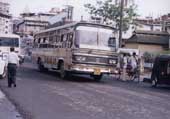 |
Dilip Ranjan borthakur
Passion for music, penchant for innovation and a desire to unearth the cultural past drove Dilip Ranjan Borthakur, the first doctorate in music from the region, to explore and stretch his professional boundaries to accommodate his appetite for melody.
A musicologist, a teacher and a performer, Borthakur’s numerous designations, however, can little indicate of his commitment and talent.
His thesis on A Study of Musical Instruments of Assam with a Statistical Note, prepared under the guidance of former president of the Asam Sahitya Sabha Nagen Saikia and Padmabhushan Debu Chaudhuri of Delhi University, is in itself a rich tribute to Assamese symphony.
The doctorate from Dibrugarh University finds more data in the region’s musical treasure trove than he can document.
Having penned several books, his latest publication, The Music and Musical Instruments of North Eastern India, provides a detailed catalogue of the musical instruments of the region.
“During my research I found that there are immense resources for documentation. The unique traditional instruments had not been given the required attention. I made up my mind to bring all these together, so that the people beyond this region, too, can get a taste of the vast and rich cultural heritage,” Borthakur says.
The book won accolades in the critical circle for its lucid chronicle of the instruments of the region. To quote critic Ziauddin Ahmed Hazarika, “The author, in his book, has authentically traced the origin and evolution of the traditional Indian classical music and musical instruments through ages in their chronological sequences and the impact of classical musical instruments on the musical instruments of the Northeast in general and on those of Assam in particular. The author has also shown that different styles of music and musical instruments are evolved from different tastes and temperaments of the people. In one word, a historically critical study of a vast subject in a very simple way.”
However, merely preserving the musical heritage within the pages of history did not satisfy Borthakur. He needed to find ways of propagating this heritage among the young and ensure a legacy.
Thus, with nearly single-handed efforts from Borthakur, the Chaulkhowa Music College was established. After overcoming numerous hurdles for the past 25 years, the college recently celebrated its silver jubilee.
“From a child it (the college) has become a youth — this is the hour when more efforts will be required to strongly establish the institution,” says Borthakur.
Since its inception, the college had been imparting lessons on both classical and folk music to pupils from various classes of society. “The college is a dream project. I have plans to develop it into a college-cum-research institute. It is a matter of regret that very less stress is given on preserving and promoting folk music, although much attention is paid towards folklore,” the musicologist adds.
Borthakur now plans to introduce performing arts in his college for which Dibrugarh University registrar Kandarpa Kumar Deka had requested recently.
“This is a good gesture from the university authorities, they have also assured us affiliation for the courses,” Borthakur said.
At present, the college has around 500 students, primarily from Dibrugarh and Tinsukia district in Upper Assam.
As a tabla player, he had accompanied reputed masters like Ustad Amzad Ali Khan, Ustad Illayas Khan, Pandit Manilal Nag, Sunanda Patnayak and several others, apart from playing solo in many state-level music conferences.
An interesting contribution by the musicologist is the introduction of sura bandhan khol (tuning khol), a modification of the original khol of Assam. “The khol did not have any sense of taal and tone, so we added wooden guttees for achieving tonal tuning, as is done on the tabla,” he said.
In his Seujpur residence, Borthakur spends most of the time in the company of music. His wife, Nilima, is also an accomplished sitar and sarod player.
“She helps me in all aspects, including her services to the college as a teacher,” he adds.
She also authored Sitar Vigyan, a book on the technicalities of the instruments of Assam, which has received widespread accolades.
Their two children, daughter Murchana and son Madhuriya, play sitar and tabla respectively. Both of them are also recipients of the Union government’s Centre for Cultural Resources and Training (CCRT) scholarships.
“I am glad that both our children have chosen the same path as ours, I wish that both of them shine more and more in their future,” says the proud father.
His daughter, Murchana, who had been selected for the national scholarship for young artists by the department of culture, government of India, in the field of Hindustani music (sitar), is at present an undergraduate student at Rabindra Bharati University.
She is also taking sitar lessons from Pandit Deepak Choudhury of Calcutta, a prominent disciple of Pandit Ravi Shankar.
His son Madhurjya, following in his father’s footsteps, secured 80 per cent marks in music in Class X. In 2003, he obtained the degree of Visharad in tabla from the Bhatkhande Sangeet Vidyapith (Lucknow) with first division.
“He reminds me of my early days and I hope he excels,” says Borthakur.
But the musicologist still believes that he has just begun his journey. “Lot of things are yet to be done, the infrastructure needs to be completed and more and more modern methods are to be inducted,” he says as he walks to his college campus.










